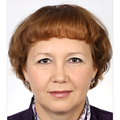As of 01.11.2022
Name of the project: Evaluation and improvement of social, economic and emotional well-being of elderly people. Institutes of fulfilment of the resource potential of the older generation. Development of a complex system for assessment of inequality of the elderly people and design of tools for their viability.
Research directions:
- Developing conceptual understanding pf nature and components of evaluating economic, social and emotional well-being
- Developing a system for complex assessment of social, economic and emotional wellbeing of elderly people
- Developing practical recommendations and solutions to enhance wellbeing of elderly people by forming model of favorable space
- Justifying necessity, possibility and practicability of substitution of the sustained stereotype of «lonely old age» for well-being of old age persons as a result of active social and economic engineering
- Development of a concept of engagement of people of the older generation into the regional community
- Development of a new complex system for assessment of inequality among the elderly people
- Development of efficient institutes for implementation of the resource potential of the older generation in the economy of ageing.
Project objective: Establishing methods and directions of implementing state policies improving well-being of elderly people.
|
Hosting organization
|
Field of studies
|
City
|
Invited researcher
|
Time span of the project
|
|---|---|---|---|---|
|
Laboratory «Interdiciplinary Research and Educaiton in Technological and Economic Challenges of the Energy Transition (CIRETEC-GT)»
Peter the Great St.Petersburg Polytechnic University - (SPbPU) |
Economics and Business |
St. Petersburg |
Devezas Tessaleno Campos |
2022-2024 |
|
Center for the Study of Diversity and Social Interactions (CSDSI)
New Economic School - (NES) |
Economics and Business |
Moscow |
Weber Shlomo
USA, Israel |
2013-2017 |
|
Center for Market Studies and Spatial Economics
National Research University Higher School of Economics - (HSE University) |
Economics and Business |
Moscow, St. Petersburg |
Thisse Jacques-François
Belgium Behrens KristianCanada |
2011-2015 |




